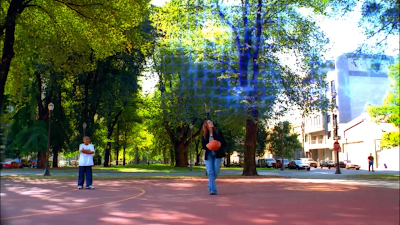Watched once before. I recall around the time it was a new release at Hollywood Video.
Watched 20120117 2AM (Netflix, Instant, HD)
What the #$*! Do We Know!? (2004) William Arntz, Betsy Chasse, Mark Vicente. 109 min
a.k.a. What the Bleep Do We Know!?
Relevant Links:
What the #$*! Do We (K)now!? (IMDb.com)
What the Bleep Do We Know!? (Wikipedia.org)
Masaru Emoto (Wikipedia.org)
20120117:
This movie had some good ideas worth thinking about. But if you're like me, then you've already thought about them and don't need this movie to enlighten you.
Regardless of whether or not you've given thought to the ideas in this documentary, the way the movie presented the ideas and the logic and reasoning was bad. As a result, the movie as a whole was bad. This may have in part be due to the portion of the movie dedicated to a fictionalized side-story used to illustrate ideas in a comedic fashion.
In any case, the movie had a way of making itself seem scientific, when in fact, it was quite unscientific. For example, the film talked about how water molecules were affected by intent, but there's no scientific evidence that pushes the validity of the outcome (that the structure of water molecules will change based on intent).
Originally, I was planning to recommend the reader watch the first forty to sixty minutes of this film. Instead, I recommend you just watch The Matrix (1999) and Inception (2010). Then as you watch them, keep in mind that what we call reality is a result of the information our senses collect and our brain's interpretation of that information.
[20120123][20151019 Edit]
Instant Comments:
lol: I'm still blogging so I put on something I've already seen.
I already understand the concept that our perceptions are distinct from reality. My own primary example is the difference in perception of a blind/color-blind/deaf person compared to a "normal" person
Given we make certain perceptions, we can alter those perceptions and change our perception of reality. But there's an extent to which the reality itself can be changed.
I don't particularly believe the majority of the logic used in this film, but I'm okay with most of the ideas. I suppose the exposition serves the purpose of getting people exposed to the philosophy
Is that Kripke from Big Bang Theory? [Yes, John Ross Bowie!]
lol: "Is that a rocket in your pocket or are you just happy to see me?"
The non-informational, but rather illustrative sections are mostly comical. Sometimes excessive.
lol: I stopped paying much attention after about the first half of the movie.
Watched 20120117 2AM (Netflix, Instant, HD)
What the #$*! Do We Know!? (2004) William Arntz, Betsy Chasse, Mark Vicente. 109 min
a.k.a. What the Bleep Do We Know!?
 |
| Lead - Amanda (Marlee Matlin) |
Relevant Links:
What the #$*! Do We (K)now!? (IMDb.com)
What the Bleep Do We Know!? (Wikipedia.org)
Masaru Emoto (Wikipedia.org)
20120117:
This movie had some good ideas worth thinking about. But if you're like me, then you've already thought about them and don't need this movie to enlighten you.
Regardless of whether or not you've given thought to the ideas in this documentary, the way the movie presented the ideas and the logic and reasoning was bad. As a result, the movie as a whole was bad. This may have in part be due to the portion of the movie dedicated to a fictionalized side-story used to illustrate ideas in a comedic fashion.
In any case, the movie had a way of making itself seem scientific, when in fact, it was quite unscientific. For example, the film talked about how water molecules were affected by intent, but there's no scientific evidence that pushes the validity of the outcome (that the structure of water molecules will change based on intent).
 |
| Reggie (Robert Bailey Jr.) asks Amanda to join him. |
Originally, I was planning to recommend the reader watch the first forty to sixty minutes of this film. Instead, I recommend you just watch The Matrix (1999) and Inception (2010). Then as you watch them, keep in mind that what we call reality is a result of the information our senses collect and our brain's interpretation of that information.
[20120123][20151019 Edit]
Instant Comments:
lol: I'm still blogging so I put on something I've already seen.
I already understand the concept that our perceptions are distinct from reality. My own primary example is the difference in perception of a blind/color-blind/deaf person compared to a "normal" person
Given we make certain perceptions, we can alter those perceptions and change our perception of reality. But there's an extent to which the reality itself can be changed.
I don't particularly believe the majority of the logic used in this film, but I'm okay with most of the ideas. I suppose the exposition serves the purpose of getting people exposed to the philosophy
Is that Kripke from Big Bang Theory? [Yes, John Ross Bowie!]
lol: "Is that a rocket in your pocket or are you just happy to see me?"
The non-informational, but rather illustrative sections are mostly comical. Sometimes excessive.
lol: I stopped paying much attention after about the first half of the movie.











No comments :